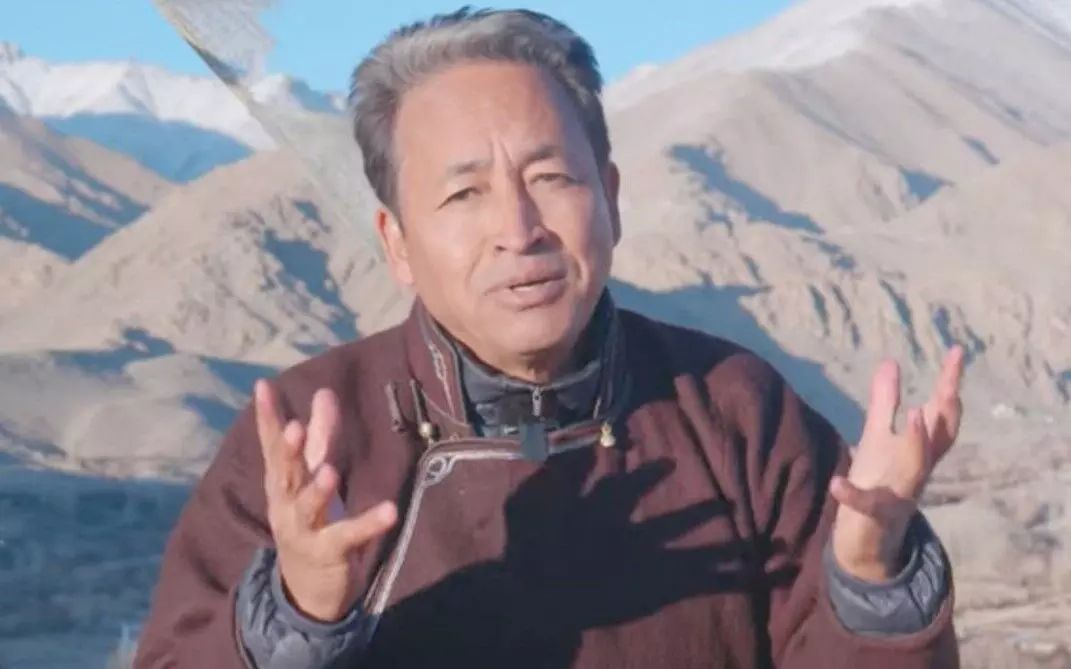‘Assault on democratic rights’: People for Himalaya group condemn Sonam Wangchuk’s arrest
The collective asserted that the arrest was an attempt to stifle the legitimate concerns of Ladakh residents
By - Newsmeter Network |
‘Assault on democratic rights’: People for Himalaya group condemn Sonam Wangchuk’s arrest
New Delhi: People for Himalaya, a collective campaign for climate and disaster justice across the mountain states, held a press conference on Tuesday, strongly condemning the arrest of renowned environmental activist Sonam Wangchuk under the National Security Act (NSA).
The campaign demanded his immediate release, calling the arrest an ‘assault on democratic rights and freedom of dissent’ and a ‘blatant attempt to silence the voices of the people of Ladakh.’
Solidarity with Ladakh, demand for accountability
The collective asserted that the arrest was an attempt to stifle the legitimate concerns of Ladakh residents regarding their constitutional rights, environment and livelihoods.
They reiterated full support for the four-point agenda of the people of Ladakh, led by the Leh Apex Body and the Kargil Democratic Alliance, which includes the demand for statehood and Sixth Schedule protection.
The campaign also condemned the violent attack on peaceful protestors in Leh, Ladakh on September 24, which resulted in the deaths of four people and injuries to over 80, with 15 reported critical. People for Himalaya described the use of excessive force, including the opening of fire on unarmed citizens, as an act of ‘brutality’ and demanded accountability at the highest level.
The collective called for:
- A high-level judicial inquiry into the violence.
- The resignation of the Lieutenant Governor and Director General of Police of Ladakh.
- The immediate release of Sonam Wangchuk and all arrested leaders.
- The withdrawal of all charges against protestors.
Climate disasters linked to ‘reckless development’
People for Himalaya drew attention to a larger crisis in the Himalayan region, stressing that the recent devastating floods and landslides during the 2025 monsoon—reported from locations including Uttarkashi, Mandi, Kishtwar, Joshimath, Dharali, Siang, Ladakh and Sikkim—are not merely natural disasters. Instead, they represent the compounded impact of climate change and poor governance driving ‘reckless models of extractive development.’
Speakers, including Sajjad Kargili of the Kargil Democratic Alliance and Atul Sati of Joshimath Bachao Sangharsh Samiti, highlighted that governments have consistently ignored a decade of warnings from scientists and civil society.
They accused authorities of prioritising short-sighted projects such as rapid commercial tourism, unregulated infrastructure expansion and deforestation that ‘increase risks rather than reduce them.’
The campaign pointed to the dilution of environmental safeguards, such as environmental impact assessment (EIA) mechanisms and exemptions for projects like four-lane highway expansions. The Char Dham road project was cited as a stark example where exemptions have overridden ecological concerns, worsening landslide risks.
This weakening of regulatory systems, the collective asserted, has directly intensified the scale and frequency of disasters.
Urgent demands for a sustainable path
Stressing that the current development trajectory is unsustainable, People for Himalaya, which was launched in 2024 to advocate for pan-Himalayan awareness, issued a series of demands for immediate corrective measures:
1. Disaster response and rehabilitation measures
- Strengthening the disaster response system with guaranteed Central government support.
- Fair rehabilitation under the Disaster Management Act (2005) and safe resettlement policies for vulnerable communities.
- Special provisions in the Forest Conservation Act 1980 to allow for the rehabilitation of communities in forest areas.
2. Infrastructure and regulation measures
- Stopping destructive mega-projects like large dams, railway corridors, and mega solar parks in fragile mountain zones.
- Strict enforcement of the Dam Safety Act (2022).
- Restructuring of key regulatory institutions like the Central Water Commission and Pollution Control Boards.
- Scrapping the Forest Conservation Act (2023) amendments and strengthening the 1994 EIA Notification to ensure rigorous, transparent, and participatory assessments.
3. Governance and community rights
- Decentralised decision-making, including the just implementation of the Forest Rights Act (2006).
- Making the free, prior, and informed consent of Gram Sabhas mandatory for all developmental projects.
- Obligatory public disclosure of all hydrological, air, and water data and hazard maps.
The collective, which included speakers like Manshi Asher of Himdhara Collective and Anmol Ohri of Climate Front Jammu, affirmed its solidarity with all Himalayan communities ‘who are resisting ecological destruction and fighting to protect their ancestral lands, democratic rights, and futures.’